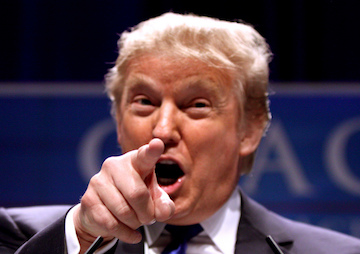Donald Trump and the New ‘News’ Zone
This presidential season's relentless flood of "news" about Trump may actually be the opposite of news. Believe it or not, there is still a world out there filled with problems we know so much less about than we should because we're all immersed in the same Trump soup. Republican presidential front-runner Donald Trump. (Gage Skidmore / CC BY-SA 2.0)
1
2
3
Republican presidential front-runner Donald Trump. (Gage Skidmore / CC BY-SA 2.0)
1
2
3
Here’s what often dominates the news zone these days:
* The Donald, The Hillary, and the others crisscrossing the country, shouting at and insulting each other, and giving more or less the same speeches (or, in the case of Trump, narcissistic rambles).
* Blood-curdling accounts of the latest terror attacks in Europe or the U.S.
* Photogenically weepy or stoic Americans bemoaning the loss of houses, schools, and lives in what the news now regularly refers to as “extreme weather” (without a hint — 99% of the time — of why that weather might be increasingly extreme).
* And let’s not forget those remarkably ever-present American “lone wolf” killers who take out their fellow citizens with numbing regularity in workplaces, movie theaters, military bases, schools, etc.
All of this and more, of course, becomes the essential adrenalizing fodder of the 24/7 attention machine. Sometimes, when the story’s just right, its drumbeat lasts nonstop for days, or even weeks (see: San Bernadino), with whole corps of “experts” mobilized by the network news and cable outfits to… well, you know… say whatever it is experts say.
As newspapers shrink and collapse, as local investigative reporting all but disappears, the above has become the repetitive norm for the paperless world most of us inhabit. And keep in mind that, in an age of shrinking reportorial staffs, on TV as well as in print, it’s of obvious economic advantage to pool your resources and focus audience attention on just one (or a few) magnetic events/horrors/nightmares — stories guaranteed to glue eyeballs. Some of these stories have become so common in our onscreen lives that, as with a mass killing or “violence” at a Trump rally, a formulaic way of reporting them has fallen comfortably into place, making the all-hands-on-deck moment so much easier to organize and handle. So, for instance, from the initial shock of a terror attack in Europe or the U.S. (but not, say, Iraq or Libya) to the funerals of the victims, from the early parade of counterterrorism “experts” to the last grief counselors, there is now a pattern of coverage that normalizes such events for the news zone.
The Comb-Over in the Mirror
So much of this, of course, is about money, ratings, and the coffers of those who own TV networks. Gluing eyeballs to screens (and ads) is, of course, the real news about the news.
CBS CEO Leslie Moonves couldn’t have been blunter on how the present system works. At a Morgan Stanley investors’ conference last month, speaking of the Trump campaign, he said, “It may not be good for America, but it’s damn good for CBS.” And then he added, “The money’s rolling in and this is fun. I’ve never seen anything like this, and this [is] going to be a very good year for us. Sorry. It’s a terrible thing to say. But, bring it on, Donald. Keep going.”
We know, roughly speaking, what Moonves and his ilk make of the frenetic onscreen world their employees present us with — a world of relative inconsequence that is often, at one and the same moment, horrifying, fascinating, stupefying, shocking, terrifying, enervating, saddening, and even, if you happen to like Donald or Ted or Hillary or Bernie, sometimes uplifting or hopeful. The question is: What are we to make of it?
The most obvious thing that can be said is that it leaves us painfully unprepared to face, or grasp, or begin to deal with the actual world as it actually is. What’s left out? Well, more or less everything that truly matters much of the time: any large, generally unphotogenic process, for instance, like the crumbling of America’s infrastructure (unless cameras can fortuitously zoom in on a bridge collapsing or a natural gas pipeline in the process of blowing up in a neighborhood — all so much more likely in an age in which no imaginable situation lacks its amateur video); poverty (who the hell cares?); the growing inequality gap locally or globally (a no-interest barrier the WikiLeaks-style Panama Papers recently managed to break through); almost anything that happens in the places where most of the people on this planet actually live (Asia and Africa); the rise of the national security state and of militarism in an era of permanent war and permanent (in)security in the “homeland”; and don’t even get me started on climate change…
But why should I go on when you can do this perfectly well yourself? After all, just about everything that matters much of the time means… well, just about everything that really makes a difference in your life, or national life, or planetary life. What you can see on your screen right now is plenty of Donald Trump, but what you can’t see when it comes to the United States is, for example, the increasingly undemocratic, unrepresentative, semi-demobilized country with a new, informal constitution and new power centers that he — or some other candidate — will head in 2017. It’s largely MIA.
Independent journalism is under threat and overshadowed by heavily funded mainstream media.
You can help level the playing field. Become a member.
Your tax-deductible contribution keeps us digging beneath the headlines to give you thought-provoking, investigative reporting and analysis that unearths what's really happening- without compromise.
Give today to support our courageous, independent journalists.






You need to be a supporter to comment.
There are currently no responses to this article.
Be the first to respond.